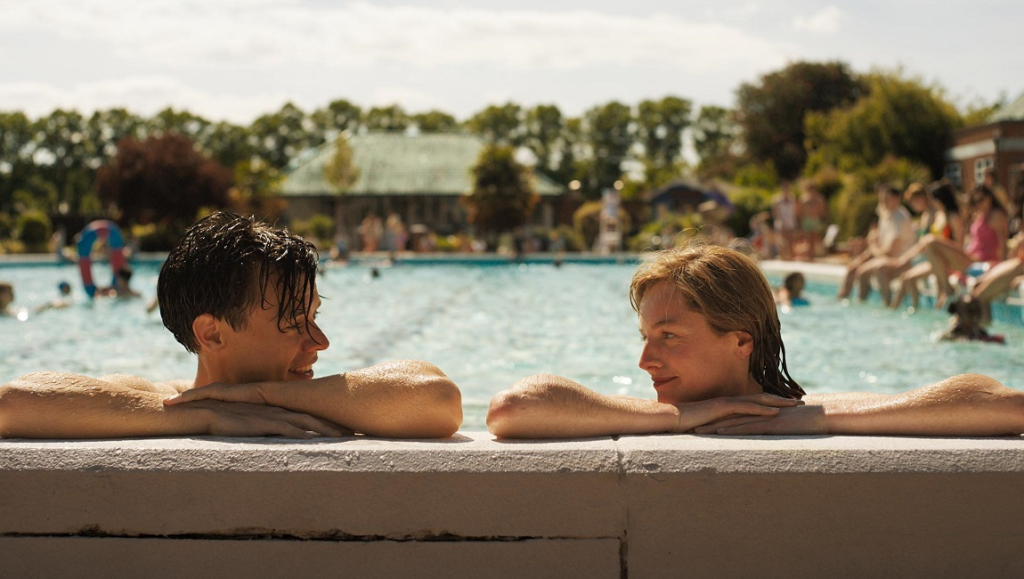My Policeman is a beige, two-hour yawn that fails to live up to superior works occupying the same thematic space.
Harry Styles kept finding himself in the headlines for all the wrong reasons this fall. First, there was the troubled production history of Olivia Wilde’s Don’t Worry Darling, whose release was accompanied by all manner of behind-the-scenes drama, from rumors of on-set friction — said to be, in part, due to Styles and Wilde’s romance — to the entire Shia LaBeouf casting saga. All of this, sometimes unsubstantiated, drama culminated with the ridiculous, though oddly engrossing, “spit-gate,” which saw Styles allegedly venting his frustrations with the taxing production and tedious news cycle by stealthily spitting on co-star Chris Pine at the film’s Venice premiere. By the time the film was released, there was a tangible sense of schadenfreude that every report of the psychological thriller’s supposed lack of quality, and Styles’ lack of acting chops in particular, was met with. Then there was the rollout for My Policeman, which was marred by reports of Styles’ subpar performance, seemingly confirmed by a clumsily enunciated emotional outburst which somehow found its way into the trailer. Perhaps most detrimentally, though, some poorly-worded comments in a Rolling Stone interview, regarding the film’s gay sex scenes, put a dent in the carefully curated “love is love” persona of the one-time X Factor contestant — already blemished by some of the more lurid speculations surrounding his relationship to Wilde — and cemented the film’s status as a post-Don’t Worry Darling semi-curiosity.
It’s worth bringing all of this up because the adaptation of Bethan Roberts’ novel of the same name, helmed by British theater director Michael Grandage, has been largely defined by its proximity to the various controversies surrounding its leading man. Whatever anticipation there was seemed to be propelled by either the ex-One Direction heartthrob’s rabid fans or by people with an insatiable morbid curiosity about what was widely described as yet another failed acting endeavor for the singer. Peeling back the layers, however, one finds a rather tepid drama that fails to hold up to any kind of pre-release excitement. The good news: it’s not as bad as some have suggested. The bad news: it would’ve likely been better off had it been. Styles, while unconvincing, isn’t the film’s only problem, as the romantic drama, set mainly in 1950s Brighton, relies too heavily on trite, tear-jerker clichés to register as anything other than flavorless, and perhaps even a little cynical. Also, Styles might be outmatched, but co-star and on-screen wife Emma Corrin doesn’t exactly clean the floor with the inexperienced Grammy-winner either, her unfulfilled housewife treatment regularly veering into stiff TV melodrama territory. David Dawson proves to be the sole highlight, imbuing his performance with equal doses of sophistication, vulnerability, and strength.
The trio at the heart of My Policeman consists of Tom (Harry Styles), the titular cop who longs to live the life of a square, in spite of his heterodox interest in art and literature, as well as his repressed homosexuality; Marion (Emma Corrin), with whom Tom shares a genuine connection, although their eventual marriage threatens to crumble under the weight of Tom’s secret; and Patrick (David Dawson), a refined art curator who is close with Tom and Marion, while carrying on a secret relationship with the former. The film splices in sequences set in the late-’90s, where the characters toil away in misery, Patrick having been immobilized by a stroke, and Marion, guilt-ridden for (entirely predictable) reasons not to be revealed until the end, taking care of him. In contrast, Tom, still in a quasi-romantic relationship with Marion, refuses to even visit his former lover, and seeing the two men’s relationship unfold in the past, while knowing what is to befall them, would be emotionally affecting if it wasn’t for the cheap, factory-settings gravitas Grandage constantly falls back on to add heft to otherwise excruciatingly bland scenes.
Styles’ insistence that this is a “universal” story rather than “a gay story about these guys being gay” is actually quite indicative of the film’s issues, as My Policeman‘s LGBTQ+ credibility fits snuggly alongside Styles’ usual pop star vagueries about tolerance, kindness, and self-acceptance — alongside broad nods to gender equality and Black Lives Matter, pretty much the party line for any celebrity with an overwhelmingly young audience these days. Problem is, the film is in fact a gay story — how many straight stories see their characters beaten to a bloody pulp or thrown in jail because someone found out they’re straight? — and Tom’s quiet, stifled anguish calls for a layered sensitivity that the awkward leading man simply can’t provide. Contrasted with Franz Rogowksi’s complex performance in this year’s vastly superior gay drama Great Freedom, it becomes apparent just how dry and unspecific Styles’ take on the role is. And considered as a whole, Great Freedom director Sebastian Meise’s inquiries into gay desire under a system that criminalizes it yield far more engaging and complicated results, far beyond what this beige, two-hour yawn manages to come up with. It’s unfortunate, but even with all the noise surrounding it, My Policeman is ultimately just another sad queer period drama that fails to meaningfully add to the numerous works already occupying that space.
You can currently stream Michael Grandage’s My Policeman on Amazon Prime Video.


Comments are closed.